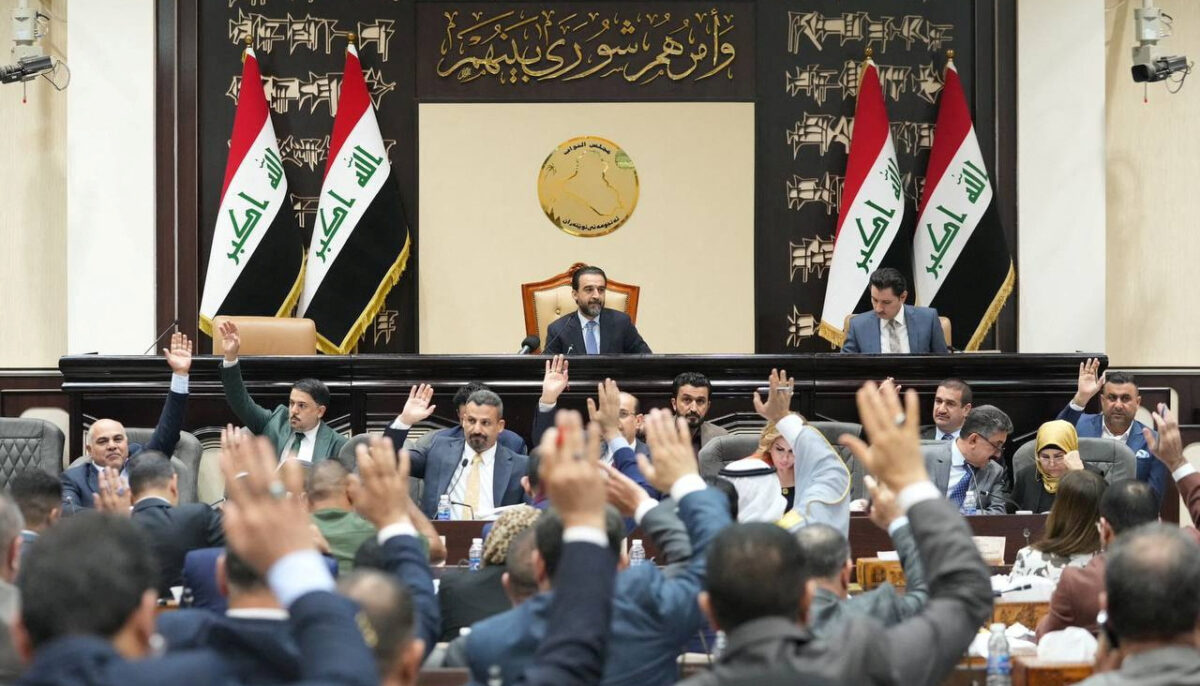Days after the Jordanian parliament approved a cybercrime law with disastrous implications for free speech, Iraq put forth its own with even worse consequences. The Iraqi parliament is divided between advocates who believe the law provides more robust protections against cybercrimes and those who see in it an end to freedoms.
“The adoption of the law was delayed due to political differences,” said Raed al-Maliki, a member of the Legal Committee in the Iraqi parliament, to local media. “The cybercrime law imposes penalties that could restrict freedom of expression, although it does contain articles that safeguard freedoms, curb online extortion, and hold blackmailers accountable.”
On June 5, 2022, after a period of deliberation, the Iraqi Security and Defense Parliamentary Committee announced that it would reintroduce the cybercrime draft law for parliament to vote on. The draft was met with opposition from some MPs, who cited numerous violations of freedoms. They believe that including this law in the agenda of upcoming sessions would violate the internal parliamentary system.
Rather than fight cybercrime, the law gives the state the authority to monitor and punish people’s online activities, especially on social media. Voting on its enactment did not take place in the current parliamentary session, and legislators called for its amendment.
Life Sentences and New Legal Terms
Articles 3 and 6 of the proposed law stipulate severe penalties for individuals who use “computers and information networks” to harm the country or engage in dangerous activities. The law mentions some examples such as “inciting armed disobedience,” “provoking sectarian conflicts,” and “disrupting public security and order.” Punishments for these practices range from fines reaching 50 million dinars (~ 38,000 US dollars) to life imprisonment.
Article 22 imposes temporary imprisonment and fines of up to 30 million dinars on individuals establishing, managing, or supporting websites that promote “immorality or indecent content” and on those advocating such content.
Iraqi journalist and human rights activist Akram Al Sayyab raised concerns about the draft law, stating that it lacks “legal professionalism” and leans heavily towards a “police-oriented approach.” Al Sayyab is concerned about incorporating elements from the Iraqi Penal Code No. (111) of 1969, effectively treating certain compound offenses as crimes against freedom of opinion and expression.
According to Article 18, anyone found engaging in actions that attack religious, moral, family, or social principles or invade the sanctity of private life using information networks or devices will be subject to punishment. The penalty is severe, entailing a minimum imprisonment of one year and fines ranging from two to five million dinars.
Without clear and precise definitions, relative concepts such as “social principles or values” could easily be used to prosecute individuals exercising their right to freedom of expression and criticism. The broad scope of what constitutes an offense and the harsh penalties imposed may have a chilling effect on open discourse and discussion online. Even those who mention any of these “values and principles” may face such accusations.
“The draft law is a field of landmines,” warned Iraqi human rights specialist Mohammad Jumaa. He told SMEX that a call for organizing a demonstration or criticizing the Prime Minister or any political-religious figure might be reframed as a “disturbance to public security.”
Without adequate explanation or definition, the broad reference to family and moral values leaves room for misinterpretation. Individuals may find themselves at risk of imprisonment for advocating gender equality, for example, according to Jumaa.
“This draft of the cybercrime law primarily protects the political class from attacks on social media,” he added. “It punishes anyone who resorts to insults with three years in prison, compared to two years for the more serious crime of online extortion.”
Violating the Iraqi Constitution and International Covenants
Aside from the vague terminology and the imbalance between the alleged “crimes” and their corresponding penalties, the draft law also contradicts the principles laid out in Article 19 of the “Universal Declaration of Human Rights,” which Iraq signed in 1948.
This article explicitly asserts that “everyone has the right to freedom of opinion and expression; this right includes freedom to hold opinions without interference and to seek, receive and impart information and ideas through any media and regardless of frontiers, either orally, in writing or print, in the form of art, or through any other media of his choice.”
Furthermore, the proposed cybercrime law conflicts with the International Covenant on Civil and Political Rights, to which the Iraqi constitution’s preamble explicitly affirms commitment.
The draft law contradicts the Iraqi constitution, which explicitly states in Article 21 the need to “complement the legislative system by enacting laws referred to in the constitution in alignment with international treaties. This includes safeguarding the right to freedom of opinion and expression and enacting laws to protect journalists and ensure access to information.”
Al Sayyab also highlights that some of the concepts introduced in the draft law, such as “national security crimes,” are entirely new and have not been previously mentioned or discussed. Additionally, the reported measures that would restrict the government’s financial freedom and prevent citizens from questioning or scrutinizing the government’s financial disclosure are seen as a breach of the social contract established between the Iraqi citizen and the government during the last elections. Such actions, Al Sayyab asserts, infringe upon the citizen’s democratic and legal rights to hold the government accountable and participate in democratic processes.
As per the assessment of the Iraqi jurist, the cybercrime draft law poses a threat to freedom of the press and freedom of expression. It diminishes the opportunities to expose and discuss past corruption cases through communication channels. He argues that the law is crafted with the intent to curtail public involvement in government affairs, infringing upon democratic principles and fundamental freedoms.
Systematic Suppression of Online Speech
According to a report jointly published by Amnesty International and the INSM Foundation for Digital Rights on July 18, both organizations have expressed concerns that the reintroduction of the Cybercrime Law and the proposed draft law on freedom of expression and peaceful assembly “would severely restrict the rights of the Iraqi people.”
“Political blocs are exploiting societal challenges, like online extortion, to manipulate citizens into thinking the Law alone can address these problems,” Hayder Hamzoz, the Executive Director of INSM, told SMEX.
Hamzoz expressed disappointment in the legislators and the government, particularly the Minister of Telecommunications, for neglecting the amendments and suggestions put forth by civil society in Iraq.
He called on the Iraqi government to promptly withdraw the law and consider adopting the proposed amendments. Hamzoz emphasized the need for direct dialogue concerning the draft law to protect Iraqi internet users and their data.
On March 5, 2023, the Iraqi Parliament ignited heated discussions on a draft law pertaining to freedom of expression, assembly, and peaceful demonstration. However, mounting concerns have cast a shadow over the proposed legislation, with critics fearing it could pave the way for severe curbs on public freedoms.
Today, during its re-evaluation, there is apprehension that the law may lead to arbitrary trials, targeting individuals who make public statements deemed to violate “public morals” or “public order.”
On January 10, 2023, the Iraqi Ministry of Interior introduced “Ballegh,” an online platform where individuals can report social media content that “violates public morals” and “undermines social stability.”
The ministry released an accompanying Youtube video explaining the rationale behind the platform. He directed his message to Iraqi citizens, emphasizing their crucial role in reporting content considered to be “indecent” and “offensive to public taste, customs, traditions, and military institutions.” In the video, an officer equated reporting such content to combating organized crime, as he believed it led to the disintegration of the Iraqi family.
Iraq is not the only country facing an escalating crackdown on online discourse. Last Thursday, the Jordanian Parliament passed the Cybercrime draft Law for the year 2023, with its hefty fines and long prison sentences. The law, which sparked regional and international condemnation, punishes social media users for their online activity, leading to detrimental consequences for freedoms in Jordan.



